Cats exhibit a wide variety of bizarre habits that would leave you perplexed.
The majority of these tendencies are entirely evolutionary, the product of thousands of years of life in the wild and evolution.
For always, there is a method behind the madness.
Yes, it is normal for a cat to bite your ear and it is usually a sign of attachment, unless the bite cuts the skin, in which case you should prevent it by determining why she bites you.
In today’s post, we’ll look at cats’ biting habits. We’ll go into why cats want to bite your ears in particular.
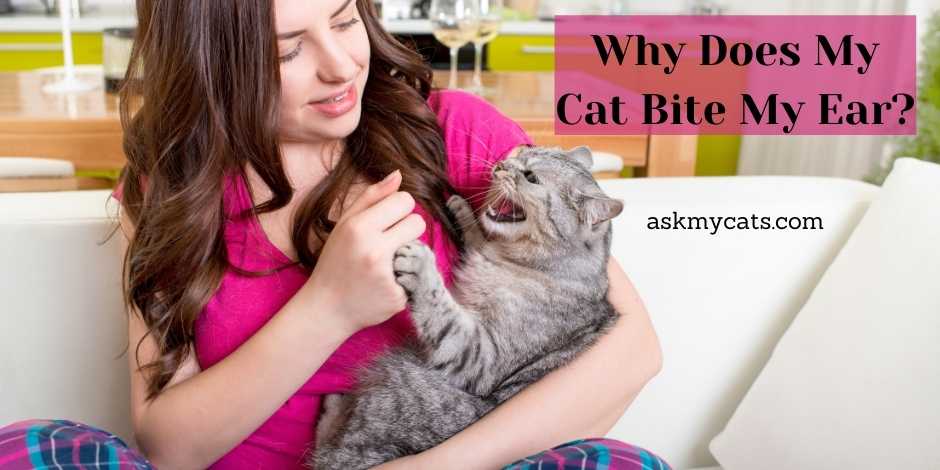

Give Your Cat the Perfect Day
Get the Free Ebook!
Why Does My Cat Bite My Ear Lobe?
The cat bites your ear for a variety of reasons, including attraction to wax, fascination with the ear, a need for attention/need for something, and to express love and affection.
Cat owners sometimes mistake a nip with a bite. If your cat is biting and nipping your ear, she is most likely not trying to split skin and is either being playful or hungry.
Most indoor cats have a lot of behaviours when it comes to expressing love, calling for games, or eating. It is your responsibility to determine which is which.
I always play with my four fur kids until bedtime, and then feed them, and most nights, two or three of them will cuddle up in bed with me and not wake me until the morning.
Then one of them will suck and nip my nose, another will hump my leg while biting my toes through the scarf, and a third will come up to me and stick his rear end to my face.
The fourth one respects their space and never bugs me until it’s time to eat, at which point she wants cuddles. Four distinct cats have their own set of behaviours, which is entirely normal.
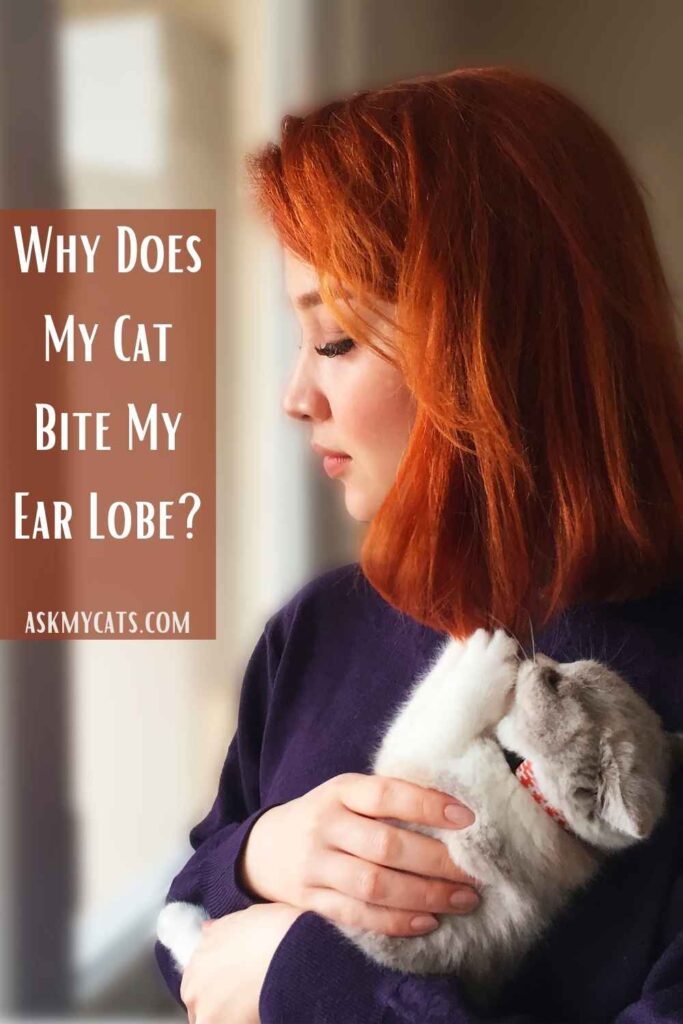
1. Earwax
The scent of human earwax is very enticing to cats, which might sound strange. Although humans are oblivious to the odour, a cat will scent your earwax from a few feet away.
To get closer to the ear wax, a cat can scale your body and bite your ears. Earwax is attractive to cats because it has a good odour. Dead skin cells, fatty acids, and even cholesterol are the primary sources.
2. Shape And Texture
Your cat is still intrigued by the form and feels of your ear and bites it. Your ear is the best toy to nibble on because of its firm yet flimsy skin and cartilage.
Cats usually nibble on your ear because it is nice for their teeth or mouth.
3. Want Attention
If a cat is trying to get your attention, it will bite your ear. This may be due to boredom or the perception that you are avoiding them.
They can even bite your ear to coerce you into playing with them. They can even bite your ear to communicate with you.
It’s possible that your cat is doing this to get you to top up their food bowl when they’re sick or wounded.
4. Show Love
Finally, a cat will bite your ear to express their affection for you. These bites are usually mild and do not reach the flesh.
Cats are conscious that the ear is a delicate spot, and they want to appease you by gently chewing it. This is a trait that many kittens from the same litter exhibit.
Should I Be Worried If My Cat Is Biting My Ear?
No, it’s not a big deal if your cat bites your ear, particularly if it’s just a light nibble.
As you can see from the examples above, this is a very normal and natural trait in cats.
Only if the cat becomes offensive and penetrates the skin should you be worried. If this is the case, you should begin preventing your cat from chewing your ear.
Interesting Read: Why Does My Cat Purr And Bite Me?
How To Get Your Cat To Stop Biting Your Ear?
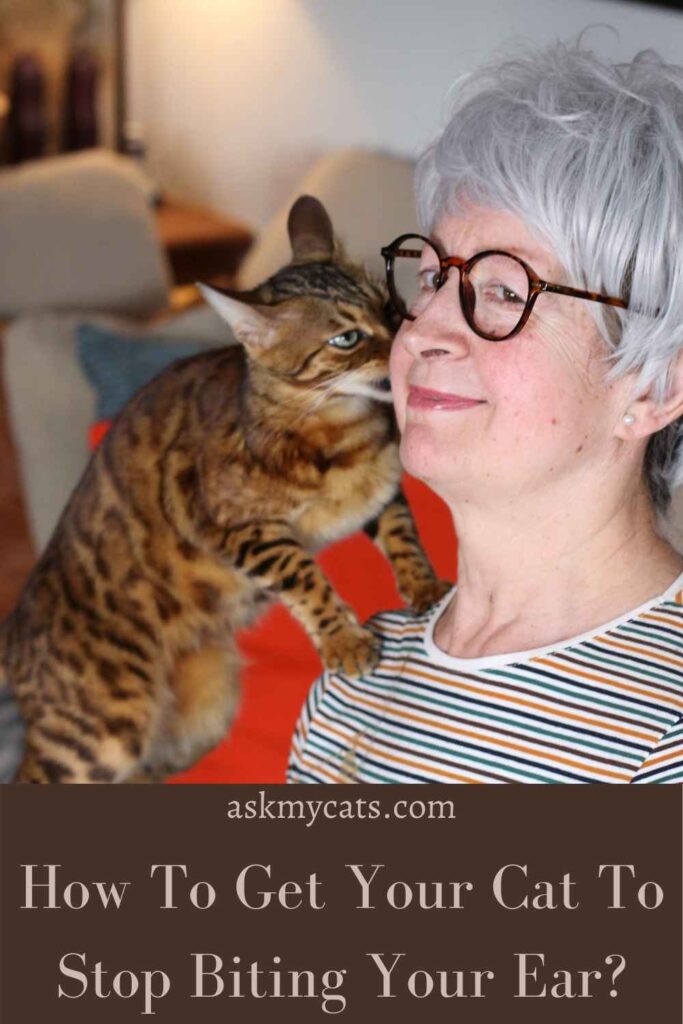
You should never let your cat be bored or else they will start biting and nibbling your ears.
There are a few things you can do to keep your cat from chewing your ear.
The first step is to take care of your personal hygiene. Since cats are drawn to ear wax, you can brush your ears more often.
You should also remember to start paying more attention to your pet and playing with them more often so that they don’t get bored and bite your ear.
You might even buy your pet a new chewy treat to make them less likely to chew on your ear.
Finally, make sure your cat’s food and water bowls are still finished.
What Does It Mean When a Cat Licks Your Ear?
For one thing, it means that your cat adores you. They understand that you are the one who cooks, covers, and looks after them, and they are attempting to reciprocate your affection.
If your cat has never nibbled or licked your ear, don’t be insulted. That doesn’t mean your cat doesn’t care for you. Any cats really do not use this as a means of expressing their affection for their parents.
I have two cats at the moment. One of my cats is obsessed with my paws, while the other is almost uninterested.
They both love me equally, I realise. We actually spend more quality time together because the lap cat isn’t drawn to earwax. As a result, cats have their own distinct personality and means of expressing their gratitude to their owners.
Why Does My Cat Bite Me Gently?
The nibbling on your ear could be best described as gentle chewing. It’s a token of love, and you may take it as a compliment if you’re okay with it.
If you wish to stop your pet from gently biting you, make a disapproving noise and move away from them as they bite.
Don’t overreact or your cat can get agitated and go into fight or flight mode. Alternatively, literally insult them by rebuffing their love and affection.
Why Does My Cat Nibble My Ear?
Most cats chew and nibble on their owners sometimes, and certain cats like ears in particular because they are mostly attracted to the owner’s earwax.
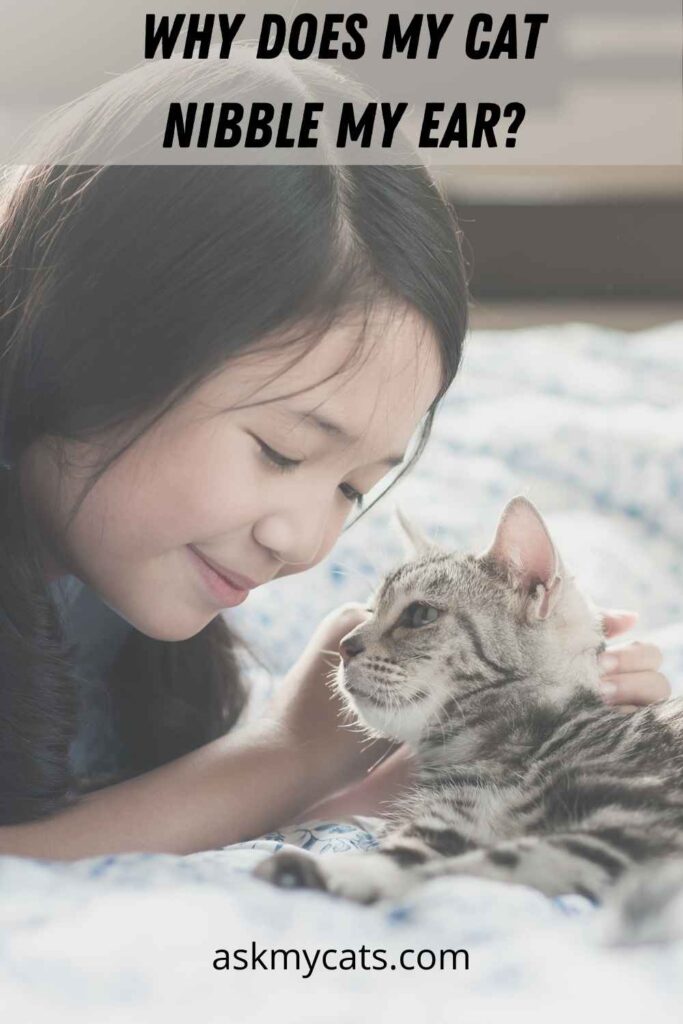
While endearing, let’s face it: it’s not the most fun encounter.
Their tongues are like sandpaper, their breath sounds like cat food (no surprise), and they paw at us with their paws on occasion.
Ears are particularly appealing to cats for a variety of reasons.
Most of the causes being that they are drawn to the scent of your ears, which also extends to you though your ears are immaculately clean (earwax in particular).
Earwax has a distinct odour that is only found in our ears. It’s very strong for cats with their sensitive nose and heightened sense of smell, even though we can’t smell it.
When cats brush up to us, they transmit their scent to us and ours to them, letting other cats know who they belong to.
The ears are an excellent choice for this. They will switch all scents back and forth while they brush your ear, which is why you’ll usually see them cleaning themselves afterward.
Another explanation is that cats are attracted to the form of our earlobes and find it difficult to avoid them. Is your cat scratching your ears while kneading you?
It gives them a relaxed feeling to nibble on our lobes and it reminds them of when they were kittens nursing on their mothers.
Is this to say that you can allow your cat to lick and nibble on your ear? It’s all up to you to decide.
Why Is My Cat Obsessed With My Ears?
Cats, in particular, are obsessed with your ears because they are sensitive to the smell of animal proteins.
So, it seems that cats are attracted to licking earwax in each other’s ears, as well as, according to a few tweets, their owner’s filthy q-tips, since their olfactory (scent) and brain receptors need nutritional benefit.
Cats have only 500 taste buds, and their smell receptors greatly outnumber ours to compensate for their lack of taste buds. The protein content in earwax attracts them, and they can lick another cat’s ears as a result.
My male cat will rub his sister’s ears before she spins and strikes him, walks away, and seems irritated, as in the case of my cats.
Why Does My Cat Purr In My Ear?
Cats will purr inside your ears to communicate some vital information with you.
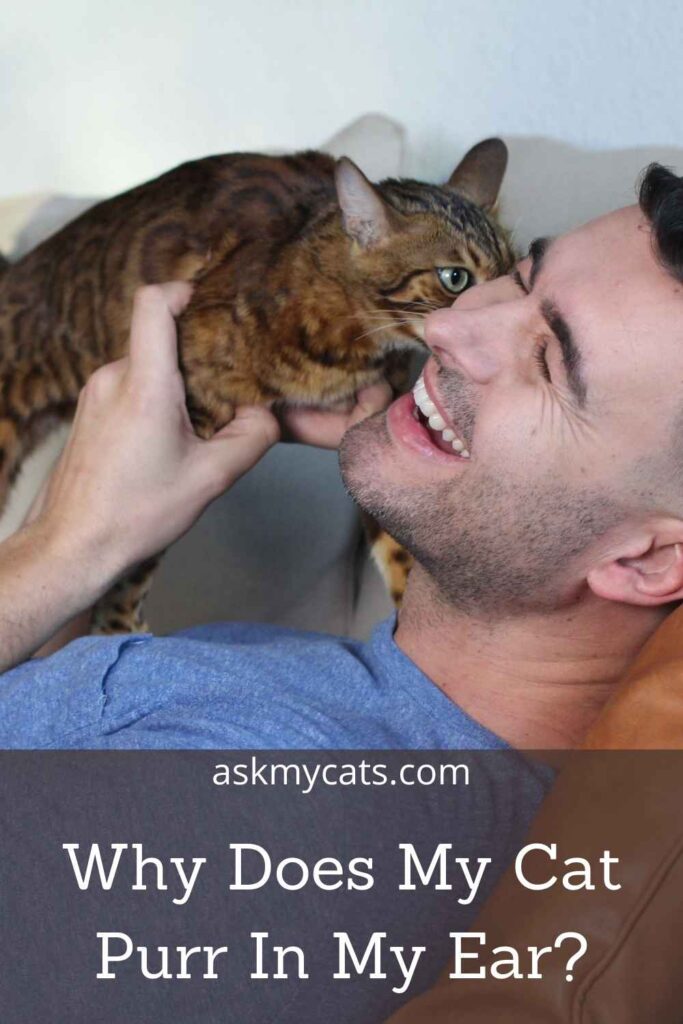
The exact way the purr is formed is still up for debate. That could be a vocalisation or it could be something else entirely. This is a sound that can be used for a variety of purposes, regardless of how it’s produced.
A cat can purr itself (and you!) to sleep, which means calm, confidence, and well-being. A nursing mother purrs as her kittens feed, and the kittens purr back.
This sounds similar to the later adult “relaxed” purr and seems to be a bonding and calming sound. Adult cats sometimes purr as they brush each other.
A cat’s purr can sometimes be interrupted by a trilling sound. When you’re catching and petting the cat, you’ll normally hear this, not when it’s purring to itself or another cat. Singing is the term for this.
Cats purr as they catch prey. The purr is thought to serve as a hypnotic on the prey animal, reducing its struggle.
Finally, an abused cat purrs sometimes, but it is a louder, raspier, and very noisy purr. The calm purr, breastfeeding purr, and trill are normally followed by kneading, but the prey and pain purrs are not.
Why Does My Cat Sniff My Ear?
Cats sniff our ears as a means of communication, and their sense of smell is much superior to ours.
Cats are fascinated by a variety of scents and, unlike other people, like the stronger scents on the body. If it’s your cat, it’ll most likely be especially interested in smelling you.
It’s completely innocent, and they don’t do it too much, unlike many dogs who would stick their noses straight in your ears if they aren’t restrained.
Smell provides animals with a wealth of unadulterated knowledge which is even better than we are capable of. So, in a nutshell, your kitten was collecting data on you.
It’s for the same purpose that dogs sniff each other’s behinds. It provides a wealth of knowledge that they may not otherwise have access to.
Frequently Asked Questions
Why does my cat bite my nose and ears?
Cats demonstrate their outrage in a number of ways, and if your cat is particularly enraged and near your face, they can bite you on the nose to show their displeasure. A gentle nip or scratch to the nose, on the other hand, may be your cat’s way of expressing love when they can’t verbalise it or hold you as a person can.
Why does my cat bite me gently?
As a sign of love, some cats can softly nibble or bite their owners. It is most common in cats that have had litters and is thought to be reminiscent of how a mother cat grooms her kittens with little bites.
Final Words
If your cat is nibbling, kissing, or softly chewing your neck, they are simply expressing their affection and appreciation for you in their own unique way.
The scent of earwax draws them to your paws, as well as the ears of other cats with which they are familiar.
If there’s something you don’t like, you should set the ground rules and politely discourage them from doing it without insulting them.
However, it is one of the best compliments a cat will pay a person. So, while it’s one of those slightly unpleasant stuff we’d rather not have happen, it’s pretty fun when it does.
Don’t forget to drop down your valuable suggestions in the comments section below!
